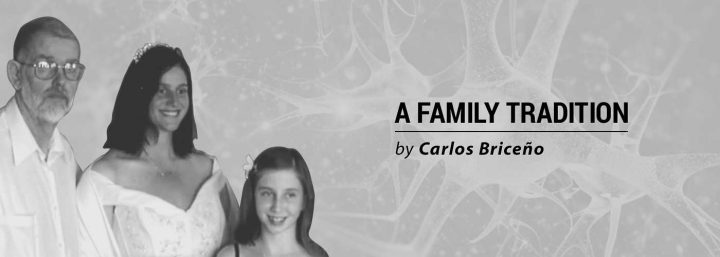Cultivating Patience Requires Patience
Written by |

Patience doesn’t just happen. It takes work.
Would you enter a weightlifting competition, run a marathon, or perform stand-up comedy without planning and practicing? You probably wouldn’t. So why do we expect ourselves just to be patient?
When my wife, Jill, learned that she carries the Huntington’s gene, we started to discuss issues we might face in the future. Recently, we focused on the possibility of shifts in her mental state. Jill is a calm person who tends to find humor in stressful situations. One day that might change. One day, she may become less calm and more irritable. When that happens, I want to be prepared. I want to be able to handle whatever comes my way with love and patience.
Love is the easy part. We love each other, and I don’t plan on that changing anytime soon. As patient as I believe myself to be, however, I could always learn to be more patient.
I sat down and wrote a list of all our plans. We were in the middle of the holiday season, so we had no shortage of places to be and people to see. I included the grocery store, the mall, and all the other places we needed to go to get everything we needed. After all, you can’t go to a Christmas party without food and gifts. After I wrote the list, I thought about all the ways I could work on my patience.
There are many different ways to work on your patience before you ever leave your car. For example, you are looking for a space in the parking lot. You know the scene. All the spaces near the entrance are full. It’s raining, and you’re late. You drive around for five minutes before you find someone who is pulling out of their space. You activate your turn signal and wait politely, but before you can park, someone swings into the spot.
Can you feel your blood pressure rising as you read this?
It is so easy to get mad and make shopping stressful. But looking for a parking spot doesn’t have to be stressful. I decided that I would work on my patience muscles during a recent trip to Costco. For example, I could try to think of parking as a game or a way to spend extra time with my loved one. I could imagine the person who took my spot was in a hurry because they needed medicine for their sick child. I could be happy that I am healthy enough to drive at all.
Once inside the store, I continued to work on my patience muscles. Getting a cart alongside 10 other people is similar to watching caged animals being set loose, but I waited patiently for everyone to get a cart before I grabbed mine.
If you’ve ever been to a store such as Costco, you can imagine how the rest of the visit went. It involved people cutting in front of me with their carts, several crying children, long lines, and stressed people — all opportunities to work on my patience muscles. It’s going to pay off one day as Jill’s disease progresses.
***
Note: Huntington’s Disease News is strictly a news and information website about the disease. It does not provide medical advice, diagnosis, or treatment. This content is not intended to be a substitute for professional medical advice, diagnosis, or treatment. Always seek the advice of your physician or other qualified health provider with any questions you may have regarding a medical condition. Never disregard professional medical advice or delay in seeking it because of something you have read on this website. The opinions expressed in this column are not those of Huntington’s Disease News or its parent company, Bionews Services, and are intended to spark discussion about issues pertaining to Huntington’s disease.






Leave a comment
Fill in the required fields to post. Your email address will not be published.